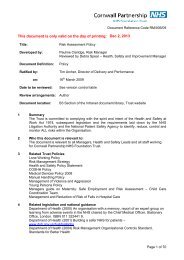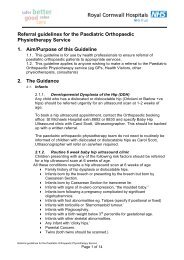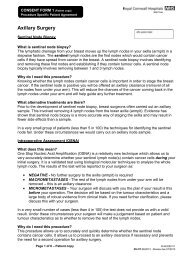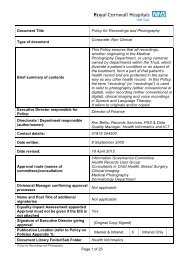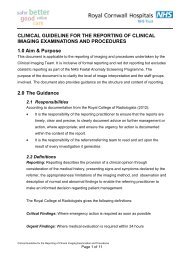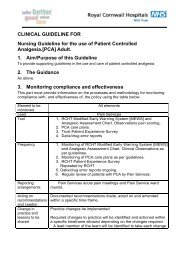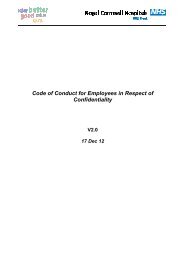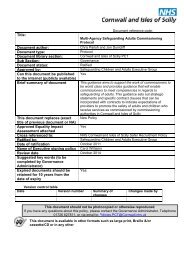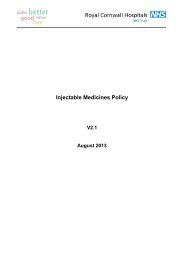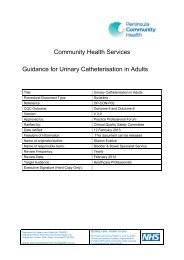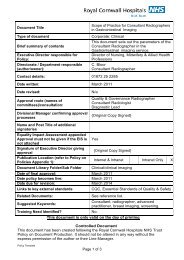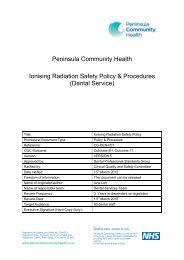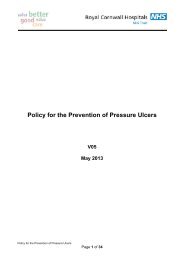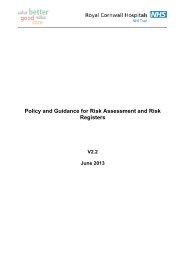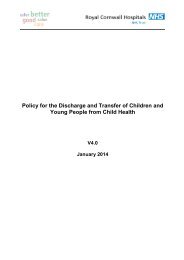Safeguarding Vulnerable Adults Policy - the Royal Cornwall ...
Safeguarding Vulnerable Adults Policy - the Royal Cornwall ...
Safeguarding Vulnerable Adults Policy - the Royal Cornwall ...
You also want an ePaper? Increase the reach of your titles
YUMPU automatically turns print PDFs into web optimized ePapers that Google loves.
Title:<br />
Document author:<br />
Document type:<br />
Document library section:<br />
Sub Section:<br />
Document status:<br />
Approved by:<br />
Can this document be published<br />
to <strong>the</strong> internet (publicly<br />
available)<br />
Brief summary of document<br />
This document replaces (exact<br />
title of previous document or<br />
NA)<br />
Approved Equality Impact<br />
Assessment attached<br />
Cross referenced to:<br />
Document reference code:<br />
NHS <strong>Cornwall</strong> and Isles of Scilly <strong>Safeguarding</strong> <strong>Vulnerable</strong><br />
<strong>Adults</strong> <strong>Policy</strong><br />
Chris Parish<br />
<strong>Policy</strong><br />
<strong>Cornwall</strong> and Isles of Scilly PCT<br />
Governance<br />
Ratified<br />
<strong>Safeguarding</strong> Children and <strong>Adults</strong> Executive Group<br />
Yes<br />
This policy has been written to provide staff working for NHS<br />
CIOS with a guide to <strong>the</strong>ir responsibilities in <strong>the</strong> management<br />
of vulnerable adults. It should be read in conjunction with <strong>the</strong><br />
<strong>Cornwall</strong> and Isles of Scilly Multiagency <strong>Safeguarding</strong> <strong>Adults</strong><br />
<strong>Policy</strong><br />
New <strong>Policy</strong><br />
Yes<br />
<strong>Cornwall</strong> and Isles of Scilly Multi-agency <strong>Safeguarding</strong> <strong>Adults</strong><br />
<strong>Policy</strong><br />
Ratified by:<br />
<strong>Safeguarding</strong> Children and <strong>Adults</strong> Executive Group<br />
Date of ratification October 2011<br />
Name of Executive signing Carol Williams<br />
policy<br />
Review date October 2014<br />
Suggested key words (to be<br />
completed by Governance<br />
Administrator)<br />
Expired documents should be<br />
retained for 10 years from <strong>the</strong><br />
date of expiry<br />
Version control table<br />
Yes<br />
Date Version number Summary of changes Changes made by<br />
This document should not be photocopied or o<strong>the</strong>rwise reproduced.<br />
If you have any questions about this policy, please contact <strong>the</strong> Governance Administrator, Telephone<br />
01726 627811, or via email to Policies.PCT@<strong>Cornwall</strong>.nhs.uk<br />
This document is available in o<strong>the</strong>r formats such as large print, Braille &/or cassette/CD<br />
or in any o<strong>the</strong>r<br />
1
Page 2<br />
Consultation<br />
List <strong>the</strong> individuals (use titles only)/groups consulted. This<br />
must include <strong>the</strong> Counter Fraud Local Security Management<br />
Specialist<br />
Multiagency <strong>Safeguarding</strong> <strong>Adults</strong> Unit<br />
Cluster Director of Nursing<br />
<strong>Safeguarding</strong> Children and <strong>Adults</strong> Executive Group<br />
Indicate which of <strong>the</strong><br />
consultees in <strong>the</strong> left hand<br />
column have responded<br />
Yes<br />
Yes<br />
Yes<br />
Consultation comments received<br />
None<br />
Comments<br />
Accepted<br />
Comments<br />
rejected<br />
Reason for rejection<br />
Disseminate to: Please use titles or groups of staff<br />
GP’s, Continuing Healthcare, Commissioning and Prescribing<br />
Dissemination methods: Please details how dissemination will be undertaken and by whom<br />
Electronically Via Tracey Coles<br />
Aim:<br />
To ensure that NHS <strong>Cornwall</strong> and Isles of Scilly Staff comply with national and local<br />
guidance on safeguarding vulnerable adults<br />
Purpose:<br />
To provide NHS <strong>Cornwall</strong> and Isles of Scilly staff with guidance on safeguarding vulnerable<br />
adults<br />
Objectives: List <strong>the</strong> objectives to be achieved. They must be Specific, Measurable, Realistic<br />
and Timebound (SMART)<br />
Staff to be able to identify abuse or neglect<br />
Staff to know where to access advice and support<br />
Staff to know how to raise a safeguarding adults alert<br />
Responsibilities: Detail <strong>the</strong> responsibilities of all in this section<br />
All NHS <strong>Cornwall</strong> and Isles of Scilly Staff to work to <strong>the</strong> guidance in this policy<br />
Definitions/Glossary:<br />
None<br />
2
Introduction:<br />
This policy has been written to provide staff working for NHS CIOS with a guide to <strong>the</strong>ir<br />
responsibilities in <strong>the</strong> management of vulnerable adults. It should be read in conjunction with <strong>the</strong><br />
<strong>Cornwall</strong> and Isles of Scilly Multiagency <strong>Safeguarding</strong> <strong>Adults</strong> <strong>Policy</strong><br />
Text of document (remember to refer to organisational format requirements)<br />
Training: Has a training need been identified? If so what is it and how will it be addressed<br />
No<br />
Key Performance Indicators: List how you, as <strong>the</strong> policy author, will measure <strong>the</strong> success<br />
of achievement against <strong>the</strong> objectives<br />
Monitoring quality and number of safeguarding alerts made by NHS <strong>Cornwall</strong> and Isles of<br />
Scilly staff<br />
Monitoring: To which Board/sub-committee/committee will <strong>the</strong> results of <strong>the</strong> outcome of <strong>the</strong><br />
assessment against <strong>the</strong> key performance indicators be reported<br />
<strong>Safeguarding</strong> Children and <strong>Adults</strong> Executive Group<br />
Equality Impact Assessment: Attach a completed EIA prior to submitting for<br />
approval/ratification<br />
3
NHS <strong>Cornwall</strong> and Isles of Scilly<br />
<strong>Safeguarding</strong> <strong>Vulnerable</strong> <strong>Adults</strong> <strong>Policy</strong><br />
11 th July 2011<br />
Chris Parish, Designated Nurse for <strong>Safeguarding</strong> <strong>Adults</strong><br />
4
Contents Page<br />
Page 3<br />
Page 5<br />
Page 5<br />
Page 6<br />
Page 7<br />
Page 7<br />
Page 8<br />
Page 8<br />
Page 9<br />
Page 11<br />
Page 12<br />
Introduction and Scope<br />
What should you do if you suspect someone is being abused?<br />
Reporting suspected abuse<br />
Reporting suspected abuse that involves a member of NHS CIOS<br />
staff<br />
Mental Capacity<br />
Self-Neglect or Consent to Intervention<br />
Commissioning Responsibilities<br />
Staff development<br />
<strong>Safeguarding</strong> <strong>Adults</strong> Strategy Process<br />
Appendix One Flow Chart –How to make a safeguarding adults alert<br />
Where to find an <strong>Safeguarding</strong> <strong>Adults</strong> Alert Form (SA22)<br />
5
1. Introduction and scope of <strong>the</strong> policy<br />
NHS <strong>Cornwall</strong> and Isles of Scilly (NHS CIOS) works in partnership with o<strong>the</strong>r agencies in<br />
<strong>Cornwall</strong> to safeguard <strong>the</strong> dignity, quality of life and safety of vulnerable adults in <strong>Cornwall</strong>.<br />
This policy has been written to provide staff working for NHS CIOS with a guide to <strong>the</strong>ir<br />
responsibilities in <strong>the</strong> management of vulnerable adults. It should be read in conjunction<br />
with <strong>the</strong> <strong>Cornwall</strong> and Isles of Scilly Multiagency <strong>Safeguarding</strong> <strong>Adults</strong> <strong>Policy</strong><br />
http://www.cornwall.gov.uk/Default.aspx?page=5519<br />
The policy applies to all staff working in NHS <strong>Cornwall</strong> and Isles of Scilly including those on<br />
temporary or honorary contracts, bank staff, students, and independent contractors such as<br />
GPs.<br />
All services will be provided in a manner that respects <strong>the</strong> rights, dignity, privacy and beliefs<br />
of all individuals concerned and does not discriminate on <strong>the</strong> basis of race, culture, religion,<br />
language, gender, disability age, or sexual orientation<br />
2. Definitions and Requirements<br />
A vulnerable adult is a person ‘who is or may be in need of community care services by<br />
reason of<br />
mental or o<strong>the</strong>r disability, age or illness, and who is or may be unable to take care of him or<br />
herself, or<br />
unable to protect him or herself against significant harm or exploitation’<br />
(‘No Secrets’ section 2.4)<br />
Abuse can be defined as ‘a violation of an individual’s human and civil rights by any o<strong>the</strong>r<br />
person or persons’<br />
(‘No Secrets’ section 2.5)<br />
Abuse can consist of a single act or repeated acts over time. It may be physical, verbal or<br />
psychological. It may be an act of neglect or an omission to act, or it may occur when a<br />
vulnerable person is persuaded to enter into a financial or sexual transaction to which he or<br />
she has not consented or cannot consent.<br />
Regulation 11 of <strong>the</strong> Health and Social Care Act 2008 (Regulated Activities)<br />
Regulations 2009-11 state;<br />
The registered person must make suitable arrangements to ensure that service users are<br />
safeguarded against <strong>the</strong> risk of abuse by means of—<br />
(a) Taking reasonable steps to identify <strong>the</strong> possibility of abuse and prevent it before it<br />
occurs; and<br />
(b) Responding appropriately to any allegation of abuse.<br />
(2) Where any form of control or restraint is used in <strong>the</strong> carrying on of <strong>the</strong> regulated activity,<br />
<strong>the</strong> registered person must have suitable arrangements in place to protect service users<br />
against <strong>the</strong> risk of such control or restraint being—<br />
(a) Unlawful; or<br />
(b) O<strong>the</strong>rwise excessive.<br />
6
(3) The registered person must have regard to any guidance issued by <strong>the</strong> Secretary of<br />
State or an appropriate expert body, in relation to—<br />
(a) The protection of children and vulnerable adults generally; and<br />
(b) in particular, <strong>the</strong> appropriate use of methods of control or restraint.<br />
(4) For <strong>the</strong> purposes of paragraph (1), “abuse”, in relation to a service user, means—<br />
(a) sexual abuse;<br />
(b) physical or psychological ill-treatment;<br />
(c) <strong>the</strong>ft, misuse or misappropriation of money or property; or<br />
(d) neglect and acts of omission which cause harm or place at risk of harm.<br />
Regulation 18 of <strong>the</strong> Health and Social Care Act 2008 (Regulated Activities)<br />
Regulations 2009-11 state;<br />
(1) Subject to paragraphs (3) and (4), <strong>the</strong> registered person must notify <strong>the</strong> Commission<br />
without delay of <strong>the</strong> incidents specified in paragraph (2) which occur whilst services are<br />
being provided in <strong>the</strong> carrying on of a regulated activity, or as a consequence of <strong>the</strong> carrying<br />
on of a regulated activity.<br />
(2) The incidents referred to in paragraph (1) are—<br />
Document Reference Code:AP/003/11Page 5 of 16<br />
(e) any abuse or allegation of abuse in relation to a service user;<br />
(f) any incident which is reported to, or investigated by, <strong>the</strong> police;<br />
Paragraph (2)(f) does not apply where <strong>the</strong> service provider is an English NHS body.<br />
(4) Where <strong>the</strong> service provider is a health service body, paragraph (1) does not apply if, and<br />
to <strong>the</strong> extent that, <strong>the</strong> registered person has reported <strong>the</strong> incident to <strong>the</strong> National Patient<br />
Safety Agency.<br />
(5) In this regulation—<br />
(a) “The 2005 Act” means <strong>the</strong> Mental Capacity Act 2005;<br />
(b) “Abuse”, in relation to a service user, means—<br />
(i) Sexual abuse,<br />
(ii) Physical or psychological ill-treatment,<br />
(iii) Theft, misuse or misappropriation of money or property, or<br />
(iv) Neglect and acts of omission which cause harm or place at risk of harm;<br />
3. Who may be an abuser?<br />
Anybody can be an abuser and abuse can occur in any setting. Often, people who abuse<br />
vulnerable adults are well known to <strong>the</strong> person. For example, <strong>the</strong>y may be:<br />
• A paid carer or volunteer<br />
• A partner, relative or friend<br />
• A health, social care or o<strong>the</strong>r worker<br />
• A visitor or o<strong>the</strong>r contact<br />
• Ano<strong>the</strong>r vulnerable adult<br />
4. What should you do if you suspect someone is being abused?<br />
If you are informed or suspect that an individual for whom you commission or provide care<br />
to is being abused, you must make sure <strong>the</strong> person is not in danger and protect <strong>the</strong>m from<br />
immediate harm.<br />
7
You should <strong>the</strong>n make a written record in <strong>the</strong>ir notes identifying what you have been told or<br />
witnessed and any immediate actions you have taken. You must include <strong>the</strong> date and time,<br />
details of any observed injuries (use of body maps to record injuries is recommended) and<br />
<strong>the</strong> setting in which <strong>the</strong> allegation has occurred.<br />
It is important to ei<strong>the</strong>r raise an alert immediately (or for commissioners to ensure that alert<br />
has been raised) and to inform <strong>the</strong> Corporate Risk Manager at <strong>the</strong> same time as making <strong>the</strong><br />
alert.<br />
It is good practice to discuss your intention to make a safeguarding adults alert with <strong>the</strong><br />
service user involved. If <strong>the</strong>y ask you to keep <strong>the</strong> information ‘a secret’ you should inform<br />
<strong>the</strong>m that you cannot do this as it is your duty to pass <strong>the</strong> information to <strong>the</strong> Access Team.<br />
Even if <strong>the</strong> patient does not give consent, you have a duty of care to make a safeguarding<br />
adults alert where <strong>the</strong> patient may be exposed to significant harm or where o<strong>the</strong>r vulnerable<br />
adults may be at risk.<br />
If <strong>the</strong> suspected abuse involves a colleague (or a member of staff more senior to you) and<br />
you are anxious about raising this, you may find it helpful to refer to <strong>the</strong> Trust Whistle<br />
Blowing <strong>Policy</strong> and/or to consult with <strong>the</strong> Designated Nurse/Associate Designated Nurse for<br />
<strong>Safeguarding</strong> <strong>Adults</strong>.<br />
4.2 Reporting suspected abuse<br />
All <strong>Cornwall</strong> <strong>Safeguarding</strong> Adult alerts should be made through <strong>the</strong> Access Team on 0300<br />
1234 131.<br />
Telephone Contact must be followed up by faxing or emailing a completed SA22 within 48<br />
hours to 01872 326613 /email accessteam.referral@cornwall.gov.uk<br />
Isles of Scilly <strong>Safeguarding</strong> Adult alerts should be made to 01720 422148.<br />
A copy of <strong>the</strong> alert form (SA22) should be faxed to <strong>the</strong> Designated Nurse/Associate<br />
Designated Nurse for <strong>Safeguarding</strong> <strong>Adults</strong> for NHS CIOS on 01726 627829.<br />
The Access Team will make a decision at this stage as to whe<strong>the</strong>r this is a safeguarding<br />
issue and if so <strong>the</strong> information will be passed from <strong>the</strong> access team to <strong>the</strong> relevant<br />
coordinating manager for action.<br />
Alerters will be notified in writing whe<strong>the</strong>r <strong>the</strong> alert has been accepted into <strong>the</strong> safeguarding<br />
process. If it has not staff will be informed in writing of any o<strong>the</strong>r action taken.<br />
If staff are not happy with <strong>the</strong> decision taken by <strong>the</strong> access team regarding <strong>the</strong> safeguarding<br />
adults threshold <strong>the</strong>y should discuss this with <strong>the</strong>ir team leader / line manager and <strong>the</strong><br />
Designated Nurse/Associate Designated Nurse for <strong>Safeguarding</strong> <strong>Adults</strong>.<br />
4.3 Role of <strong>the</strong> Coordinating Manager<br />
The term ‘coordinating manager’ refers to <strong>the</strong> managers within <strong>Cornwall</strong> Partnership NHS<br />
Foundation Trust or Department of Adult Care and Support who have <strong>the</strong> responsibility for<br />
coordinating <strong>the</strong> response to an individual <strong>Safeguarding</strong> Adult alert.<br />
The coordinating manager has overall responsibility for ensuring that <strong>the</strong> correct procedures<br />
are followed according to <strong>the</strong> multi agency policy and practice guidance.<br />
Ensure <strong>the</strong> service user remains in a place of safety until fur<strong>the</strong>r advice is received from <strong>the</strong><br />
coordinating manager.<br />
8
4.4 What Happens next<br />
The safeguarding manager at <strong>the</strong> ACS Access Team will look at <strong>the</strong> referral and decide<br />
whe<strong>the</strong>r <strong>the</strong>re is a need for this to be looked at under <strong>the</strong> <strong>Safeguarding</strong> procedures. They<br />
will liaise with <strong>the</strong> relevant Coordinating Manager and decide on <strong>the</strong> need for fur<strong>the</strong>r action.<br />
This may be an investigation. Depending on <strong>the</strong> outcome of interagency discussion, staff<br />
may need to provide additional information, attend Adult Protection Strategy meetings/Case<br />
Conferences, and participate in <strong>the</strong> investigation, needs assessment and future protection<br />
plan. If, following <strong>the</strong> interagency discussion, it is decided that no Adult Social<br />
Care/<strong>Cornwall</strong> Partnership Trust/Police involvement is necessary, <strong>the</strong> multi-disciplinary<br />
team responsible for care will need to decide whe<strong>the</strong>r fur<strong>the</strong>r internal<br />
proceedings/investigation are required.<br />
Often <strong>the</strong>re will be a need for a complex care plan to support <strong>the</strong> situation, which will<br />
sometimes need a multi agency approach.<br />
5. Reporting suspected abuse that involves a member of NHS CIOS staff<br />
Make an adult protection alert as detailed in section 4.2<br />
Ensure that form SA22 is completed<br />
Inform <strong>the</strong> HR department and take advice as to whe<strong>the</strong>r <strong>the</strong> Professional<br />
Body of <strong>the</strong> alleged abuser should be informed. This decision should be taken at Executive<br />
level of NHS CIOS.<br />
The member of staff should be suspended from duty pending an investigation under <strong>the</strong><br />
trust’s disciplinary procedure. The timing of this should form part of <strong>the</strong> strategy discussion<br />
at <strong>the</strong> earliest possible opportunity.<br />
If you are not <strong>the</strong> staff member’s line manager, ensure <strong>the</strong>ir line manager is informed as<br />
soon as possible.<br />
A decision will be made at Executive NHS CIOS level, advised by <strong>the</strong> HR department, about<br />
when to inform <strong>the</strong> Independent <strong>Safeguarding</strong> Authority.<br />
9
6 Mental Capacity Act<br />
The Mental Capacity Act 2005 is underpinned by a set of five key principles<br />
• A presumption of capacity – every adult has <strong>the</strong> right to make his or her own decisions and<br />
must be assumed to have capacity to do so unless it is proved o<strong>the</strong>rwise<br />
• The right for individuals to be supported to make <strong>the</strong>ir own decisions – people must be<br />
given all appropriate help before anyone concludes that <strong>the</strong>y cannot make <strong>the</strong>ir own<br />
decisions<br />
• That individuals must retain <strong>the</strong> right to make what might be seen as eccentric or unwise<br />
decisions<br />
• Best interests – anything done for or on behalf of people without capacity must be in <strong>the</strong>ir<br />
best interests<br />
• Least restrictive intervention – anything done for or on behalf of people without capacity<br />
should be <strong>the</strong> least restrictive of <strong>the</strong>ir basic rights and freedoms.<br />
• The Act introduces a new criminal offence of ill treatment or neglect of a person who lacks<br />
capacity. A person found guilty of such an offence may be liable to imprisonment for a term<br />
of up to five years.<br />
Where an individual is deemed to lack capacity it is imperative that, if <strong>the</strong>y do not<br />
have family or friends to act on <strong>the</strong>ir behalf, an Independent Mental Capacity<br />
Advocate is requested.<br />
7. Self-Neglect or Consent to Intervention<br />
It is not unusual for people to refuse a particular form of care due to lack of insight into <strong>the</strong><br />
need for intervention. Examples may be<br />
• A person with dementia sends away a home care worker who is tasked to do cleaning or<br />
prepare a meal<br />
• A person who is incontinent but is reluctant to wear pads<br />
• A person with schizophrenia refuses <strong>the</strong>ir depot injection<br />
In <strong>the</strong>se situations <strong>the</strong> assessment of <strong>the</strong> person’s capacity to make <strong>the</strong>se decisions is key.<br />
If <strong>the</strong> person lacks capacity to consent to an intervention, <strong>the</strong> law permits actions to be<br />
taken in <strong>the</strong>ir best interests. In <strong>the</strong>se circumstances, skilled and sensitive responses from<br />
staff will frequently enable <strong>the</strong> task to be completed. However, a patient may have<br />
appointed a lasting power of Attorney under <strong>the</strong> Mental Capacity Act. If so, this person is<br />
legally empowered to make decisions on behalf of <strong>the</strong> patient and must be consulted.<br />
The effect of <strong>the</strong> failure to provide <strong>the</strong> particular intervention will vary with <strong>the</strong> nature of <strong>the</strong><br />
care or treatment. Consideration must always be given to <strong>the</strong> likely effect of <strong>the</strong> failure to<br />
provide <strong>the</strong> planned care or treatment, to <strong>the</strong> person, <strong>the</strong>ir environment and to those around<br />
<strong>the</strong>m. This will help determine <strong>the</strong> urgency of <strong>the</strong> decision-making needed regarding<br />
implementation of <strong>the</strong> care plan.<br />
It is imperative that in circumstances where an incapacitated person is refusing or resisting<br />
care or treatment, discussions are held with senior staff to consider how to ensure <strong>the</strong><br />
appropriate care is delivered.<br />
If necessary <strong>the</strong>se discussions should include <strong>the</strong> wider team and family/carers and be<br />
documented in <strong>the</strong> patient’s record.<br />
8. Commissioning Responsibility<br />
Where commissioners are made aware that a safeguarding alert has been made regarding<br />
a patient that <strong>the</strong>y fund <strong>the</strong>y should<br />
10
• Inform <strong>the</strong> Designated Nurse/Associate Designated Nurse for <strong>Safeguarding</strong> <strong>Adults</strong><br />
• Ensure commissioning is fully engaged in <strong>the</strong> safeguarding adults process includes<br />
participation in <strong>the</strong> strategy process and attendance at meetings.<br />
• Review <strong>the</strong> care of o<strong>the</strong>r patients being funded in <strong>the</strong> care setting<br />
• Record in full <strong>the</strong> nature of <strong>the</strong> alert and any action taken on <strong>the</strong> patient’s records.<br />
9. Staff Development<br />
9.1 Training<br />
There are different levels of adult protection training including:<br />
• Induction / Introductory level Training – provided as an e learning package (All new<br />
employees must complete on <strong>the</strong>ir first day at work)<br />
• Human rights one day training (All staff having direct patient contact must complete<br />
this course).<br />
• Provider Manager/Team Leader Training – one half day multi-agency training<br />
coordinated by Adult Care and Support Learning Training and Development Group.<br />
• Specific HR training around safe recruitment and management of allegations against<br />
staff.<br />
9.2 Staff Recruitment<br />
Rigorous recruitment practices will be applied for safeguarding vulnerable adults in line with<br />
relevant requirements including 'Safer Recruitment', Care Quality Commission Standards,<br />
National Health Litigation Authority. Accordingly <strong>the</strong> following will be completed when<br />
recruiting staff:<br />
Check of <strong>the</strong> relevant professional register to ensure <strong>the</strong>y are currently registered, on <strong>the</strong><br />
correct part of <strong>the</strong> register and not subject to any action by <strong>the</strong> registering body<br />
Confirmation of relevant educational qualifications/competencies<br />
Acquisition of at least two references satisfactory to <strong>the</strong> Trust including one from <strong>the</strong> line<br />
manager at <strong>the</strong>ir most recent or current employer. This must confirm whe<strong>the</strong>r or not <strong>the</strong>y are<br />
or have been subject to any fitness to practice proceedings<br />
Confirmation of career history, accounting for any gaps in employment<br />
Satisfactory Criminal Records Bureau check<br />
A fur<strong>the</strong>r level of assurance has been introduced with <strong>the</strong> Independent <strong>Safeguarding</strong><br />
Authority.<br />
10 Framework for <strong>Safeguarding</strong> <strong>Adults</strong> in <strong>Cornwall</strong><br />
10.1 <strong>Cornwall</strong> and Isles of Scilly <strong>Safeguarding</strong> <strong>Adults</strong> Board (Formerly Adult Protection<br />
Committee)<br />
This is a strategic multi-agency group responsible for ensuring that all agencies work<br />
toge<strong>the</strong>r to minimize <strong>the</strong> risks of abuse and to protect vulnerable adults when abuse has<br />
occurred. The NHS CIOS representative on this group is <strong>the</strong> Director of Nursing or <strong>the</strong>ir<br />
representative.<br />
11
10.2 <strong>Safeguarding</strong> <strong>Adults</strong> Quality and Improvement Sub Group<br />
This is a multi-agency sub-group of <strong>the</strong> <strong>Cornwall</strong> and Isles of Scilly <strong>Safeguarding</strong> <strong>Adults</strong><br />
Board. Its role is to report on and monitor progress of embedding adult protection practice<br />
into all agencies. The group shares examples of good and poor practice and resolves<br />
practice issues as <strong>the</strong>y are identified.<br />
The NHS CIOS representative on <strong>the</strong> Quality and Improvement Group is <strong>the</strong> Designated<br />
Nurse for <strong>Safeguarding</strong> <strong>Adults</strong>. .<br />
10.3 <strong>Safeguarding</strong> <strong>Adults</strong> Learning and Development Training Sub-Group<br />
This is a multi-agency sub-group of <strong>the</strong> <strong>Cornwall</strong> and Isles of Scilly <strong>Safeguarding</strong> <strong>Adults</strong><br />
Board which focuses on <strong>the</strong> development and implementation of training programme for<br />
adult protection.<br />
The NHS CIOS representative on <strong>the</strong> <strong>Safeguarding</strong> <strong>Adults</strong> learning and development<br />
training sub-group is Designated Nurse for <strong>Safeguarding</strong> <strong>Adults</strong>.<br />
10.4 <strong>Safeguarding</strong> <strong>Adults</strong> Strategy Process<br />
The adult protection strategy process requires that contact is made with <strong>the</strong> alerter and<br />
service providers when an alert regarding suspected abuse has been made. This may be in<br />
<strong>the</strong> form of a telephone call/conference. When contacted by telephone as part of <strong>the</strong><br />
strategy process you should be informed that it is part of <strong>the</strong> strategy process however staff<br />
should always clarify <strong>the</strong> status of telephone calls requesting patient/client information. The<br />
coordinating manager may decide that a face to face strategy meeting is necessary <strong>the</strong>y will<br />
identify who should attend this meeting. An outcome may be <strong>the</strong> decision to hold a case<br />
conference or it may be to take no fur<strong>the</strong>r action.<br />
10.5 Multi-Agency <strong>Safeguarding</strong> <strong>Adults</strong> Case Conference<br />
This is a multi-agency meeting where <strong>the</strong> ongoing protection of a vulnerable adult is<br />
considered. It is usually an outcome from a strategy meeting.<br />
The purpose is to consider <strong>the</strong> issues raised in <strong>the</strong> alert, agree on a course of action to<br />
safeguarding <strong>the</strong> individual and any o<strong>the</strong>r who are felt to be at risk of abuse and to ensure<br />
<strong>the</strong> agreed plan is monitored and reviewed. Consideration must be given to inviting <strong>the</strong><br />
vulnerable adult to this meeting.<br />
10.6 <strong>Safeguarding</strong> <strong>Adults</strong> Review Meeting<br />
This meeting should take place within six months of a case conference being held. It is<br />
arranged and convened by <strong>the</strong> coordinating manager. The review looks at <strong>the</strong> outcomes for<br />
<strong>the</strong> service user, revises <strong>the</strong> adult protection plan (if needed) and considers <strong>the</strong> need for<br />
fur<strong>the</strong>r action.<br />
10.7 <strong>Safeguarding</strong> <strong>Adults</strong> Independent chair<br />
Two independent chairs support co-ordinating managers in <strong>the</strong>ir role with chairing<br />
safeguarding adults strategy meetings and case conferences. They also assist in <strong>the</strong> work<br />
of <strong>the</strong> safeguarding adults unit, ensuring that <strong>the</strong> key principles of safeguarding vulnerable<br />
people are embedded across all groups and organisations in <strong>Cornwall</strong> and <strong>the</strong> Isles of Scilly<br />
12
11 Contact Telephone Numbers<br />
Access Team - To make alerts 0300 1234 131<br />
<strong>Safeguarding</strong> <strong>Adults</strong> Team for NHS CIOS – 01726 627971<br />
Multiagency <strong>Safeguarding</strong> <strong>Adults</strong> Unit<br />
<strong>Safeguarding</strong> <strong>Adults</strong> Coordinator 01872 323782<br />
<strong>Safeguarding</strong> <strong>Adults</strong> Unit Administrator 01872 324112<br />
<strong>Safeguarding</strong> <strong>Adults</strong> Training Coordinator 01872 323663<br />
13
Appendix One<br />
How to make a safeguarding adults alert<br />
Adult protection concern established following discussion with<br />
colleagues/line manager or accessing advice from Designated<br />
Professional on<br />
01726 627971<br />
Inform vulnerable adult of <strong>the</strong> need to make a referral to<br />
The Access Team<br />
NB: if you feel that informing <strong>the</strong>m of <strong>the</strong> referral will put ei<strong>the</strong>r you or <strong>the</strong><br />
vulnerable adult at greater risk do not do so.<br />
Ensure that <strong>the</strong> access team are aware that you have not informed <strong>the</strong><br />
vulnerable adult and record your reasons in your records.<br />
A <strong>Safeguarding</strong> <strong>Adults</strong> alert should be made by telephone to <strong>the</strong><br />
access team on<br />
0300 1234 131<br />
Within 48 hours of <strong>the</strong> telephone call, an SA22 Alert form should<br />
be completed and faxed to <strong>the</strong> access team on<br />
01872 326613<br />
or<br />
emailed to<br />
accessteam.referral@cornwall.gov.uk<br />
A copy of <strong>the</strong> SA22 should also be faxed to <strong>the</strong> <strong>Safeguarding</strong><br />
<strong>Adults</strong> team for NHS <strong>Cornwall</strong> &Isles of Scilly on 01726 627829<br />
The safeguarding <strong>Adults</strong> Manager will provide written feedback<br />
on <strong>the</strong> status of <strong>the</strong> alert this should be stored with records for<br />
future reference<br />
14
Appendix Two<br />
Where to access a <strong>Safeguarding</strong> <strong>Adults</strong> Alert Form<br />
A safeguarding adults alert form (SA22) can be accessed by clicking on one of <strong>the</strong> following<br />
two links.<br />
http://www.cornwall.gov.uk/index.aspx?page=5610<br />
http://intra.cornwall.nhs.uk/Intranet/AZServices/S/<strong>Safeguarding</strong><strong>Adults</strong>PCT/UsefulLinks.aspx<br />
15
Section Officer responsible for <strong>the</strong> assessment Chris Parish, Designated Nurse for <strong>Safeguarding</strong><br />
<strong>Adults</strong><br />
Name of <strong>Policy</strong> to<br />
be assessed<br />
NHS <strong>Cornwall</strong> and Isles of Scilly<br />
<strong>Safeguarding</strong> <strong>Vulnerable</strong> <strong>Adults</strong> <strong>Policy</strong><br />
Date of<br />
Assessment<br />
03/10/2011 Is this a new or existing<br />
policy?<br />
New<br />
1. Briefly describe <strong>the</strong> aims, objectives and<br />
purpose of <strong>the</strong> policy.<br />
2. Are <strong>the</strong>re any associated objectives of <strong>the</strong><br />
policy? Please explain.<br />
3. Who is intended to benefit from this policy,<br />
and in what way?<br />
No<br />
This procedure has been written to provide staff working for NHS CIOS with a guide<br />
to <strong>the</strong>ir responsibilities in <strong>the</strong> management of vulnerable adults. It should be read in<br />
conjunction with <strong>the</strong> <strong>Cornwall</strong> and Isles of Scilly Multiagency <strong>Safeguarding</strong> <strong>Adults</strong><br />
<strong>Policy</strong> http://www.cornwall.gov.uk/Default.aspx?page=5519<br />
The policy applies to all staff working in NHS <strong>Cornwall</strong> and Isles of Scilly including those on<br />
temporary or honorary contracts, bank staff, students, and independent contractors such as<br />
GPs.<br />
4. What outcomes are wanted from this policy? Employees of NHS <strong>Cornwall</strong> and Isles of Scilly to be aware of <strong>Safeguarding</strong> <strong>Adults</strong><br />
responsibilities, how to identify abuse and to report appropriately.<br />
5. What factors/forces could contribute/detract<br />
from <strong>the</strong> outcomes?<br />
6. Who are <strong>the</strong> main NHS <strong>Cornwall</strong> and Isles of Scilly and<br />
stakeholders in relation to <strong>Vulnerable</strong> adults.<br />
<strong>the</strong> policy?<br />
Multiagency <strong>Safeguarding</strong> Procedures will contribute to <strong>the</strong> outcome.<br />
7. Who implements <strong>the</strong> policy,<br />
and who is responsible for <strong>the</strong><br />
policy?<br />
Staff. NHS CIOS<br />
<strong>Safeguarding</strong> Children and<br />
<strong>Adults</strong> Executive Group<br />
8. Are <strong>the</strong>re concerns that <strong>the</strong> policy could have<br />
a differential impact on RACIAL groups?<br />
Y<br />
N<br />
Please explain<br />
16
What existing evidence (ei<strong>the</strong>r presumed or<br />
o<strong>the</strong>rwise) do you have for this?<br />
9. Are <strong>the</strong>re concerns that <strong>the</strong> policy could have<br />
a differential impact due to GENDER (including<br />
TRANSGENDER)?<br />
What existing evidence (ei<strong>the</strong>r presumed or<br />
o<strong>the</strong>rwise) do you have for this?<br />
10. Are <strong>the</strong>re concerns that <strong>the</strong> policy could<br />
have a differential impact due to DISABILITY?<br />
Y<br />
Y<br />
N<br />
N<br />
All services will be provided in a manner that respects <strong>the</strong> rights, dignity, privacy and<br />
beliefs of all individuals concerned and does not discriminate on <strong>the</strong> basis of race,<br />
culture, religion, language, gender, disability age, or sexual orientation<br />
All services will be provided in a manner that respects <strong>the</strong> rights, dignity, privacy and<br />
beliefs of all individuals concerned and does not discriminate on <strong>the</strong> basis of race,<br />
culture, religion, language, gender, disability age, or sexual orientation<br />
What existing evidence (ei<strong>the</strong>r presumed or<br />
o<strong>the</strong>rwise) do you have for this?<br />
11. Are <strong>the</strong>re concerns that <strong>the</strong> policy could<br />
have a differential impact due to SEXUAL<br />
ORIENTATION?<br />
What existing evidence (ei<strong>the</strong>r presumed or<br />
o<strong>the</strong>rwise) do you have for this?<br />
12. Are <strong>the</strong>re concerns that <strong>the</strong> policy could<br />
have a differential impact due to <strong>the</strong>ir AGE?<br />
Y<br />
N<br />
N<br />
All services will be provided in a manner that respects <strong>the</strong> rights, dignity, privacy and<br />
beliefs of all individuals concerned and does not discriminate on <strong>the</strong> basis of race,<br />
culture, religion, language, gender, disability age, or sexual orientation<br />
All services will be provided in a manner that respects <strong>the</strong> rights, dignity, privacy and<br />
beliefs of all individuals concerned and does not discriminate on <strong>the</strong> basis of race,<br />
culture, religion, language, gender, disability age, or sexual orientation<br />
17
What existing evidence (ei<strong>the</strong>r presumed or<br />
o<strong>the</strong>rwise) do you have for this?<br />
13. Are <strong>the</strong>re concerns that <strong>the</strong> policy could<br />
have a differential impact due to <strong>the</strong>ir<br />
RELIGIOUS BELIEF?<br />
What existing evidence (ei<strong>the</strong>r presumed or<br />
o<strong>the</strong>rwise) do you have for this?<br />
Y<br />
Y<br />
N<br />
All services will be provided in a manner that respects <strong>the</strong> rights, dignity, privacy and<br />
beliefs of all individuals concerned and does not discriminate on <strong>the</strong> basis of race,<br />
culture, religion, language, gender, disability age, or sexual orientation<br />
All services will be provided in a manner that respects <strong>the</strong> rights, dignity, privacy and<br />
beliefs of all individuals concerned and does not discriminate on <strong>the</strong> basis of race,<br />
culture, religion, language, gender, disability age, or sexual orientation<br />
14. How have <strong>the</strong> Core Human Rights Values<br />
of:<br />
All values fully considered by working party and during <strong>the</strong> consultation period<br />
Fairness;<br />
Respect;<br />
Equality;<br />
Dignity;<br />
Autonomy<br />
Been considered in <strong>the</strong> formulation of this<br />
policy/strategy<br />
If <strong>the</strong>y haven’t please reconsider <strong>the</strong> document<br />
and amend to incorporate <strong>the</strong>se values.<br />
18
15. Which of <strong>the</strong> Human Rights Articles does<br />
this document impact?<br />
What existing evidence (ei<strong>the</strong>r presumed or<br />
o<strong>the</strong>rwise) do you have for this?<br />
The right:<br />
• To life;<br />
• Not to be tortured or treated in an inhuman or degrading way;<br />
• To be free from slavery or forced labour;<br />
• To liberty and security;<br />
• To a fair trial;<br />
• To no punishment without law;<br />
• To respect for home and family life, home and correspondence;<br />
• To freedom of thought, conscience and religion;<br />
• To freedom of expression;<br />
• To freedom of assembly and association;<br />
• To marry and found a family;<br />
• Not to be discriminated against in relation to <strong>the</strong> enjoyment of any of<br />
<strong>the</strong> rights contained in <strong>the</strong> European Convention;<br />
• To peaceful enjoyment of possessions and education;<br />
• To free elections<br />
Consultation with Stakeholders<br />
Yes<br />
Yes<br />
Yes<br />
Yes<br />
Yes<br />
Yes<br />
Yes<br />
Yes<br />
Yes<br />
No<br />
No<br />
No<br />
No<br />
No<br />
No<br />
No<br />
16. Could <strong>the</strong> differential impact<br />
identified in 8 – 13 amount to<br />
<strong>the</strong>re being <strong>the</strong> potential for<br />
adverse impact in this policy? Y N<br />
Please explain<br />
These Guidelines have been designed to aid staff in identifying and challenging<br />
discrimination and <strong>the</strong>refore will only have a positive impact on staff and patients within <strong>the</strong><br />
<strong>Cornwall</strong> and Isles of Scilly.<br />
19
17. Can this adverse impact be<br />
justified on <strong>the</strong> grounds of<br />
promoting equality of<br />
opportunity for one group? Or<br />
any o<strong>the</strong>r reason?<br />
Y<br />
N<br />
Please explain for each equality heading (questions 8 –13) on a separate piece of paper.<br />
18. Should <strong>the</strong> policy proceed<br />
to a full equality impact<br />
assessment? Y N<br />
17. If Yes, describe why, <strong>the</strong>n proceed to a full EIA.<br />
18. If No, are <strong>the</strong>re any minor fur<strong>the</strong>r amendments that should take place?<br />
No<br />
19. If a need for minor amendments is identified, what date were <strong>the</strong>se completed and what<br />
actions were undertaken.<br />
Signed (completing officer) ……… …………………………………….. Date<br />
Signed (Head of Section) ……………………………………………………….. Date<br />
Please ensure that a signed copy of this form is sent to both <strong>the</strong> Policies Officer and <strong>the</strong> Equality and Diversity lead to be placed on<br />
<strong>the</strong> Primary Care Trust website<br />
20



